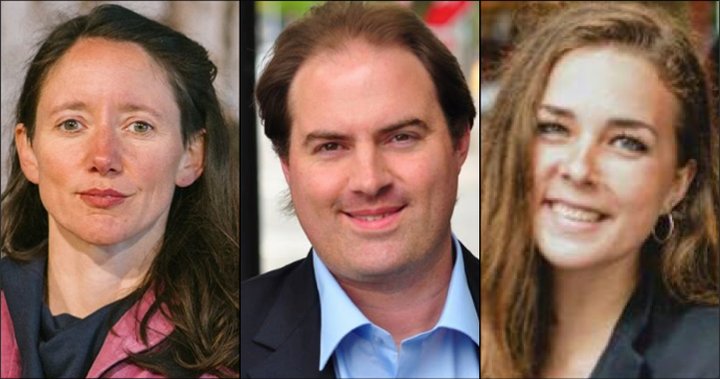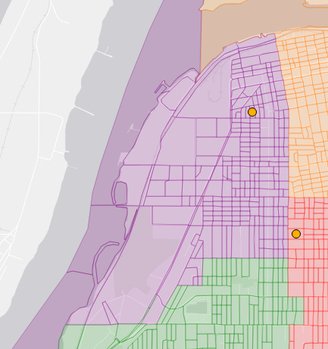
From left: First Ward Candidates Leslie Castellano, Anthony Mantova, Hailey Lamb.
Eureka’s new “True Ward” voting system doesn’t seem to have altered one of its old electoral traditions – people moving their registered voting address across town shortly before declaring themselves candidates for office.
All told, three of the four candidates for the city’s new First Ward have registered to vote at an address within that ward’s boundaries only within the last six months – Anthony Mantova, Leslie Castellano and Hailey Lamb. Only candidate Caroline Brooks has lived in the ward continuously for longer than that.
Perhaps unsurprisingly, Brooks maintains that her long residency in the First Ward is part of what makes her the best candidate in the race. Meanwhile, the other candidates, who are all long-term residents of Eureka, hold that ward boundaries don’t really mean that much in a city of this size.
“Most people don’t know where the neighborhood is,” Lamb told the Outpost. “I’d say 90 percent of the people don’t know what their ward is.”

Ward One, in purple.
The new First Ward runs roughly from C Street west and Buhne Street north, taking in much of the city’s rough and tumble West Side, as well a slice of western Old Town and a good stretch of Broadway. (See interactive map here.) Its lines were laid down in October of last year, when the Eureka City Council adopted the map drawn by LoCO user “MAD Balancing Act” as the official ward map of the city, in the wake of the passage of Measure P – the True Ward Initiative – in 2016.
Under the True Ward system, the city is divided into five equal parts, each of which elects its own representative to the City Council. This election is the first in which it will be used. Prior to this year, councilmembers were elected by the city as a whole, though candidates had to live in a particular ward to be eligible for that seat on the Council.
Mantova first registered to vote in the First Ward on April 23 of this year, switching his registration from his family-owned house near Winco to an apartment building owned by the family of Michelle Costantine, a candidate for mayor and the founder of “Take Back Eureka.” He told the Outpost that his move from the Second Ward to the First was, in fact, prompted by electoral considerations.
He said that Take Back Eureka, a citizens’ group “fed up with the way things are progressing in the City of Eureka,” held a series of meetings looking to recruit candidates to run from the various council seats up for election; finding no one from the First Ward, Mantova said, he decided to up sticks and move into the ward himself. (Though it wasn’t the only reason for the move, he said – the fact that his store, Mantova’s Two Street Music, is within walking distance is also nice.)
Mantova agreed that very few people in the ward are aware of which ward they live in, and so don’t much seem to care that, as of a few months ago, he lived a couple of blocks outside the boundary. The True Ward system, he said, was a boon for candidates for office – that many fewer doors to knock on – but he didn’t think it served the city that well. With four candidates for office in one fifth of the city, the next councilmember from the First Ward could be chosen by just a couple of hundred voters.
Though Leslie Castellano only re-registered to vote from the Fifth Ward into the First Ward on June 2, she considers the fact that she was ever registered in the Fifth Ward to begin with something of an accident.
Before renting an apartment in the ward so that she might run for council, Castellano and her spouse were living on a boat. That boat was once parked at the city’s marina near the Wharfinger Building – within the bounds of the First Ward – but they were forced to move it across the channel to Woodley Island when the city started its dredging project. Castellano said that they’re now on a waiting list to get back into the city’s marina.
“I decided that I’ve lived in Ward One for most of the past 14 years, and I was like: I guess I can’t wait on the Wharfinger anymore,” she said. “So I just decided to get a flat in the meantime.” She added that she might give up the apartment in the West Side if they’re able to get their live-aboard boat back to this side of the bay.
Hailey Lamb re-registered to vote in the First Ward on July 27, but told the Outpost that she moved to her current address after a break-up a couple of months ago. She said that she had originally planned to run for Council from a different ward, where she and her partner were living, though she wasn’t sure what ward that was. Previously she had been registered to vote at the home she grew up in, which is in the Fourth Ward.
Lamb told the Outpost she felt that being a newcomer doesn’t hurt her as a candidate – especially given her lifelong residency in the city – and she doesn’t think that it affects her ability to do the job.
“I’ve gone to the Eureka City Council meetings for the last year,” she said. “The council votes on things as a city as a whole – not just divided up into sections. They make decisions for the whole city.”

Brooks.
None of this holds water with Caroline Brooks, who told the Outpost she threw her hat in the ring specifically to give a voice to West Side residents, who have long been plagued by higher-than-average rates of crime and poverty.
“I’m running mainly because I’m tired of seeing what’s going on, or what’s not going on, in my neighborhood, and not saying anything,” said Brooks, who has lived and operated businesses in the ward for over 15 years. From her perspective, her experience in the ward – having been a victim of crime, knowing neighbors who are afraid to walk down the street – are of the first importance for people who want to represent the ward on the Council.
Will First Ward voters agree? Will long-term residency make a difference to voters under the True Ward system? Time will tell, but it hasn’t done so in the past. Under the old system, the city embraced such illustrious, out-and-proud carpetbaggers as Larry Glass, Mike Newman and Chet Albin (the latter of whom, it should be said, was appointed to his seat on the council, and later lost at the polls). The candidates, at least, don’t consider impermanence an impediment.
CLICK TO MANAGE